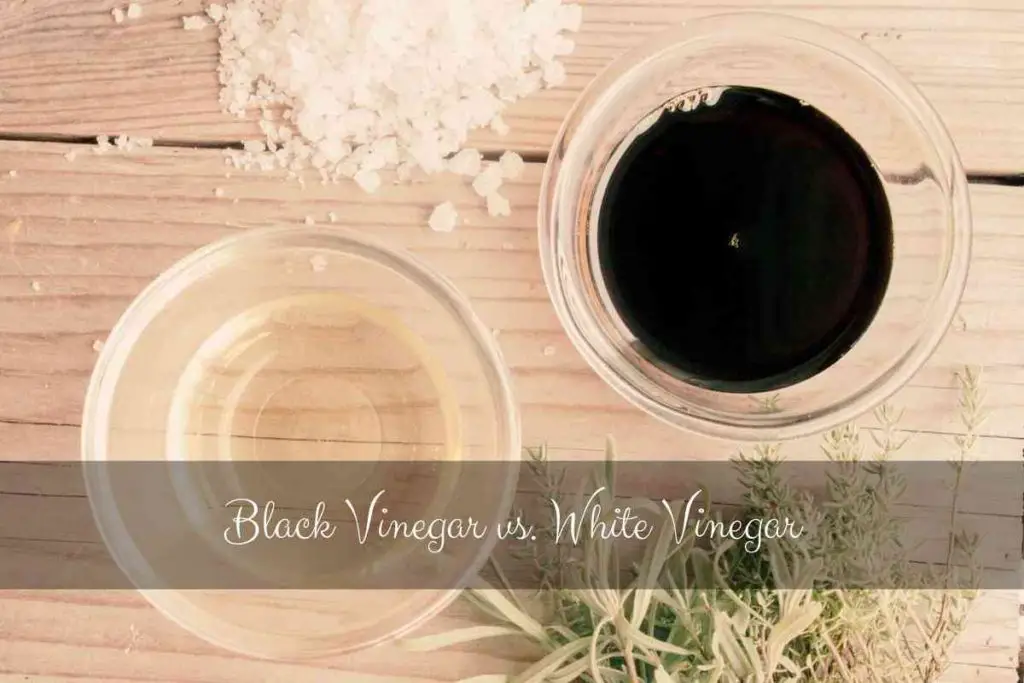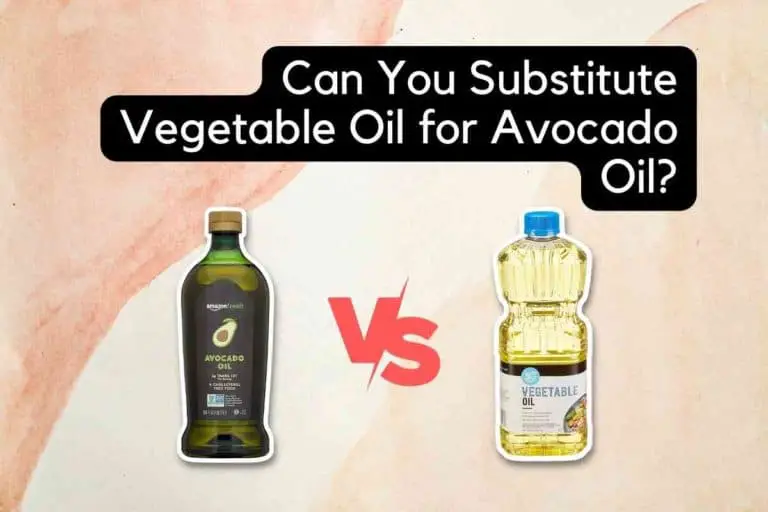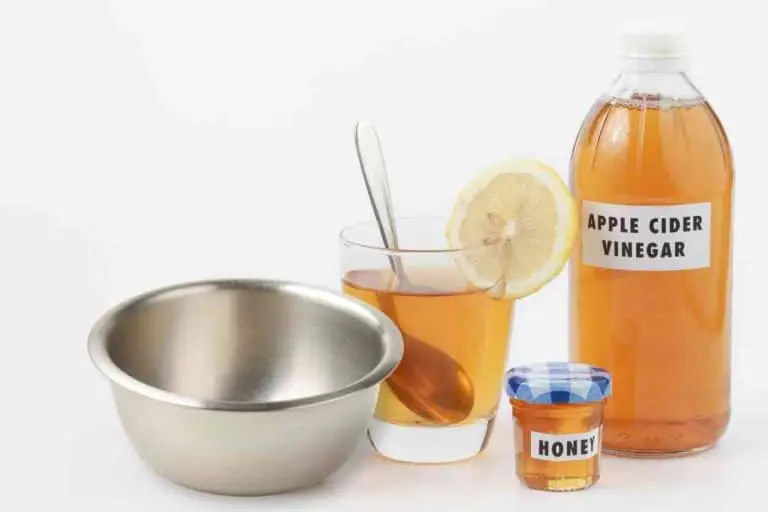Black Vinegar vs White Vinegar
What’s the difference between white vinegar and black vinegar? Here we break down what black rice vinegar is, its taste and uses, and similar ingredients like apple cider vinegar and balsamic. Plus: The difference between white vs. black rice vinegar and more.
The main difference between black and white vinegar is that black vinegar is made from fermented rice and is black in color, while white vinegar is made from distilled alcohol and is clear in color. Also, black vinegar has a stronger, more pungent flavor than white vinegar.

What Is Black Vinegar?
Black vinegar is a type of vinegar that is made from rice. It is made from a fermented mixture of rice, wheat, or sorghum.
It is black and has a strong, pungent flavor. It is often used in Asian cuisine, mainly Chinese and Japanese dishes.
Most people use wine as an alternative to black vinegar. It is essential to know the difference between wine and vinegar.
Wine is made from grapes, while black vinegar is made from various fruits, vegetables, and grains.
What Is the Taste of Black Vinegar?
There’s no sugar in black vinegar so you won’t find that sweet taste. It’s also more acidic than white vinegar and has a sharper flavor.
You’ll notice this when you use it as an ingredient in your food, especially if you’re used to white vinegar. The sourness will be more noticeable than it would be with white vinegar.
Black vinegar is also much more intense than its counterpart, which some people might not enjoy at first, but once they get used to it, they will find that they prefer the taste of black over white!
How to Make Black Vinegar?
Black vinegar is made from rice or wheat, fermented, and then aged. It is a popular condiment in Asian cuisine but can also be used as an ingredient in recipes like salad dressings!
It’s more expensive than regular white vinegar because of the time-consuming process it takes to create it.
What Is the Black Vinegar Alternative?
Vinegar is an acidic liquid typically used in the kitchen to flavor and preserves food. Although it’s often thought of as a single ingredient, several different types of vinegar are available.
For example, black vinegar is made from fermented rice or grains. The resulting liquid is dark brown with a rich, smoky aroma and a taste reminiscent of soy sauce.
What Is Black Vinegar Used For?
Black vinegar is used primarily for cooking, salad dressings, and marinades. It also plays a vital role in pickling and sauces.
You can also use black vinegar to make stews, soups, and desserts!
Can I Use Soy Sauce Instead of Black Vinegar?
Black vinegar, or suan mei chun, is sweetened rice made by fermenting glutinous rice with Chinese black vinegar fungus.
It has a mellow flavor and a lightly acidic taste, so it’s often used to enhance the flavor of meat dishes.
Black vinegar can be substituted for soy sauce in many dishes, but avoid using them interchangeably. Soy sauce is a salty condiment made from fermented soybeans; it’s commonly used as an ingredient in Asian cooking because of its versatility.
Black vinegar makes food look darker and richer than if you use regular soy sauce to season your food—but don’t worry—you won’t get any more salt in your dish if you use black vinegar instead of regular soy sauce!
Can I Use Black Vinegar to Clean?
Black vinegar is excellent to use in the kitchen, bathroom, laundry room, and other house rooms. It works well on floors, walls, and counters.
It cuts grease and leaves a nice shine behind. You can also use it to clean windows and mirrors by wiping them with a cloth soaked in black vinegar.
The vinegar smell will go away as it dries, so you won’t have any lingering odors left behind after cleaning with this product!
What Is Another Name for Black Vinegar?
A second name for black vinegar is black rice vinegar. If you’ve ever wondered what’s the difference between black and white rice vinegar, know that they’re both made from fermented rice but are produced differently.
Black rice vinegar is a traditional Chinese condiment used in many dishes, while white rice vinegar is often used as a cooking ingredient.
Black rice might be another term you’ve heard before, but it’s not necessarily the same as black vinegar or white rice.
You can make black rice from several varieties, including long-grain and short-grained; some varieties are even purple!
It has a unique flavor profile thanks to its high anthocyanin content (a type of antioxidant pigment).
Does Black Vinegar Need to Be Refrigerated?
Yes, black vinegar should be refrigerated. Black vinegar has a shelf life of about a year when stored at room temperature, but if you keep it in the fridge, that shelf life will increase to about two years.
If you’re storing your black vinegar for extended periods (like if you make a large batch), it’s best to keep it in its original container or another airtight container.
What Happens If You Drink Black Vinegar Every Day?
Black vinegar has many health benefits. It can be good for your skin and help with weight loss, digestion, heart health, and blood pressure.
The high acetic acid content in black vinegar may also help reduce blood sugar levels by slowing down the digestion of food.
Is Black Vinegar Good for High Blood Pressure?
Black vinegar is a traditional Chinese medicine that has been used for thousands of years. It’s made from dark, black rice that is fermented with water and salt to create a liquid with a distinct flavor.
Like white vinegar, black vinegar can be used in cooking or as an alternative to salt on salads and other foods.
Is Black Vinegar Stronger Than White Vinegar?
It can be difficult to compare black and white vinegar’s strength because so many factors contribute to its flavor.
Black vinegar aged much longer than white vinegar, which means it has a deeper flavor profile. The longer you age something, the stronger it becomes—and black vinegar is aged for at least two years (some as long as seven).
In addition, they’re often made in more complex ways than white vinegar: they’re stored in containers that are darker than simple glass bottles or jars; they’re usually stored in wooden barrels; some come with additional ingredients like chilies or ginger added during fermentation.
Is Black Vinegar Better Than Apple Cider Vinegar?
Black vinegar has a more robust flavor than apple cider vinegar. If you’re looking for a new vinegar to use in your cooking or try it out on your salad, black vinegar might be the way to go.
The most significant benefit of black vinegar is that it is high in antioxidants which help the body become disease-resistant and fight off free radicals that can cause damage to cells.
Black vinegar can help keep you healthy and prevent cancer and heart disease.
Can I Substitute Black Vinegar with White Vinegar?
Yes, you can substitute black vinegar with white vinegar. They’re both acidic and have similar characteristics.
Black vinegar has a more complex flavor than white vinegar, so it’s better for marinades and salad dressings. White vinegar is more popular, so you can usually find it at a lower price than black vinegar.
Black Vinegar Benefits
- Black vinegar is a good source of potassium and calcium.
- It is a good source of antioxidants and B vitamins.
- It is rich in nutrients.
- It can help with weight loss.
- Improve digestion.
- Help regulate blood sugar levels.
- It has anti-inflammatory properties.
What Is White Vinegar?
White vinegar is a colorless liquid that is made from distilled alcohol. It smells sweet, with a slight vinegar odor. It is often used as an ingredient in home cleaning products with antifungal and antibacterial properties.
White vinegar’s primary use is its ability to clean surfaces and remove stains by creating an acidic environment.
The acidity in white vinegar helps loosen dirt and grime on your kitchen counters or bathroom sink, so you don’t have to scrub as hard when cleaning them.
White vinegar also acts as a natural disinfectant and deodorizer for your home because it neutralizes odors by converting them into harmless gases.
What Is the Taste of White Vinegar?
The taste of white vinegar is a lot milder than black vinegar. It’s also a bit more neutral, with a milder acidity.
If you’re looking for something that will give your food a bit of zing but not overpower it, then white vinegar might be what you’re looking for.
How to Make White Vinegar?
You can make your homemade white vinegar by adding a cup of distilled white vinegar to a gallon of water. Let it sit for at least a month, stirring occasionally.
The longer you let it ferment, the more acidity (and thus sourness) you’ll get out of it! After a month, strain your mixture through cheesecloth or coffee filters into another clean container.
The leftover liquid should be mostly clear with little chunks floating around in it—if not, give it another week or so before straining again.
What Is the White Vinegar Alternative?
Don’t want to give up your favorite salad dressing? Rice vinegar is an excellent choice for replacing white vinegar in any recipe.
It has a mild flavor profile, and most people won’t notice the difference between rice and white vinegar.
You can also use lemon juice or apple cider vinegar as alternatives, but both have their distinct tang and may be too overpowering for some recipes.
Another option is red wine vinegar, especially if you cook something with Italian or French roots.
Red wine is known for its sharp flavor profile, so this option might be best suited for dressings or sauces paired with more decadent foods like steak or heavy cream sauces.
Lastly, if you want more diversity in your pantry but don’t want to buy three different types of vinegar, consider adding sherry vinegar into the mix!
This kind of dressing will add depth without being too strong on its own—make sure not to overdo it so that it doesn’t overpower other ingredients (like lemon zest) within your recipe!
What Is White Vinegar Used For?
White vinegar is used for many things, including cleaning, cooking, and personal care. It’s also a staple in the kitchen and is often found in salad dressings and marinades.
Here are some of the most common ways white vinegar is used. White vinegar can be used as a natural cleaning agent for various surfaces around your home. You can use it on countertops, windowsills, walls (mainly wood), floors, and more!
Can I Use Soy Sauce Instead of White Vinegar?
It might seem like soy sauce would be a good substitute for white vinegar, but it is not.
Soy sauce is salty and acidic, but not in the same way as white vinegar. Instead of the sharp bite of white vinegar, soy sauce tastes duller and rounder with a heavier mouthfeel.
If you want to use it as an ingredient in Asian recipes where it would function as both salt and acidifier (like in marinades or dipping sauces), then by all means, go ahead!
Don’t try to substitute soy sauce for white vinegar when they’re used differently in cooking.
Can I Use White Vinegar For Cleaning?
White vinegar is a great cleaning agent in its own right. It has many uses, including:
- Deodorizer: White vinegar’s strong smell can overpower the odor in your home, making it an excellent deodorizer.
- Disinfectant: White vinegar is an effective disinfectant on hard surfaces and fabrics.
- Odor remover: The acetic acid found in white vinegar helps break down organic compounds responsible for smells like sweat or body odor. Use it to remove odors from shoes and clothing by soaking them overnight before washing as you usually would with laundry detergent!
- Stain remover: White vinegar is another stain-removing powerhouse that works well on most types of stains—particularly those caused by fruits and vegetables like strawberries, ketchup, mustard, or red wine (remember that if you use it on any colored fabric, make sure that color stays intact).
What Is Another Name for White Vinegar?
White vinegar is also known as distilled vinegar, virgin vinegar, cider vinegar, wine vinegar, and cider vinegar.
Balsamic and cane vinegar is aged in barrels for several years to develop its flavors.
White Vinegar Benefits
White vinegar has many benefits.
- White vinegar is a natural disinfectant and can be used to clean surfaces in the home.
- You can use it to relieve a sore throat, alleviate the symptoms of a cold, help you breathe easier due to allergies, or even ease the symptoms of an alcohol-induced hangover.
- It is used to remove stains from clothing and fabrics.
- Effective cleaner for glass and mirrors.
- Used to remove odors from clothing and fabrics.
- It can be used as a fabric softener.
Does White Vinegar Need to Be Refrigerated?
Yes, white vinegar should be kept in the refrigerator after opening. White vinegar is fermented and will last longer if refrigerated.
White vinegar will last up to a year if kept in the fridge. It’s best to keep white vinegar in a cool, dark place (like your pantry or kitchen cabinet) away from heat.
What Happens If You Drink White Vinegar Every Day?
Drinking white vinegar every day can lead to several different health problems. The most common problems are gastrointestinal issues like nausea and vomiting.
Additionally, white vinegar is highly acidic and can damage the tooth enamel. It can also lead to dehydration and electrolyte imbalance.
Is White Vinegar Good for High Blood Pressure?
For many people, white vinegar is a natural remedy for high blood pressure. White vinegar is made from distilled wine alcohol, and when it’s diluted with water, it becomes a mild acid that can help lower your blood pressure.
When you have high blood pressure and want to manage it naturally, white vinegar can be a practical part of your treatment plan. It helps keep your arteries clean by removing the plaque buildup that can lead to heart disease and stroke.
It also reduces inflammation caused by high cholesterol levels or other conditions like diabetes, which may contribute to hypertension and other health problems such as heart disease or kidney damage due to poor circulation around those organs.
Is White Vinegar Stronger Than Black Vinegar?
There is a common misconception that white vinegar is stronger than black vinegar. However, this is not the case.
White vinegar is made from distilled ethanol, while black vinegar is made from rice. Black vinegar is stronger than white vinegar, with a pH level of 2.4.
Is White Vinegar Better Than Apple Cider Vinegar?
You may have heard that white vinegar is better than apple cider vinegar, but you might not know that white vinegar isn’t exactly more acidic than apple cider vinegar.
Because of a simple misunderstanding, many believe white vinegar has a lower pH value than black or red wine vinegar. However, it’s less acidic than black and red wine vinegar!
Here’s why: most foods have an acidity level between 1 and 7 on the pH scale (pH stands for “potential hydrogen” and indicates how acidic or basic something is).
White distilled vinegar has a pH of 2–3; this means it’s less acidic than water alone (which has an approximate pH of 7). Black distilled vinegar (such as balsamic) has around 3–4; red wine vinegar is about 4–5.
Can I Substitute White Vinegar with Black Vinegar?
Yes, you can substitute white vinegar with black vinegar. Both are made from grain and are acidic.
They both have a distinct flavor and can be used to cook and clean. If you’re looking for an alternative to the milder taste of white vinegar, then the bolder flavor profile of black vinegar will be a good substitute.
However, if you need something that works well in cleaning products like soap or detergent (not just as an ingredient), it may not be as easy to find something similar to those found in white vinegar.
Conclusion
We hope this blog post has helped you understand the differences between black and white vinegar.
As we have seen, they are very similar in their flavor but have some different uses. We hope that you’ll enjoy trying out new recipes with these ingredients!






